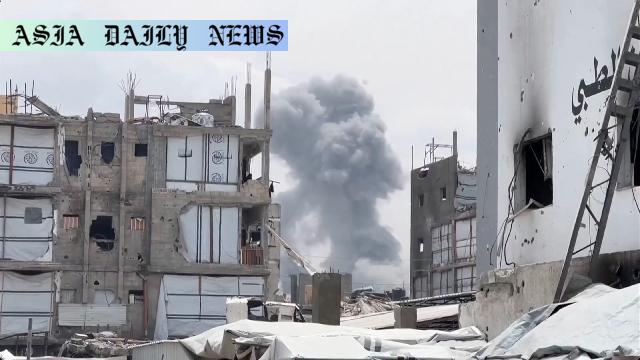Gaza Conflict: Intense Israeli military operations across the region have led to devastating casualties, exceeding 180 deaths across two days.
- Israeli military operations intensify across Gaza, causing casualties to exceed 180.
- Prime Minister Netanyahu considering an expansion if ceasefire talks fail.
- Medical officials report heavy casualties and ongoing devastation in northern Gaza.
- Ceasefire negotiations face challenges as US President Trump’s Middle East visit concludes.

Fierce Military Operations Devastate Gaza
The Gaza Strip has faced one of the most intense series of military operations in recent days. Israeli forces have unleashed a range of attacks both from the air and the ground, targeting regions across northern and southern Gaza. According to reports from medical emergency officials in Gaza, the death toll has surpassed 180, with a large number of individuals still trapped under the rubble caused by these airstrikes.
On Thursday alone, Palestinian media highlighted the devastating outcome of these operations, as 136 lives were claimed in a single day. The bombings have primarily focused on regional strongholds of Hamas, the organization Israel identifies as a primary source of conflict. Northern Gaza experienced the severity of strikes in key neighborhoods, leaving vast areas razed to the ground. Families continue to face dire conditions, with rescue teams struggling to recover individuals trapped under destroyed homes.
Israel’s Response and Strategic Decisions
Israeli authorities have defended their intensified military campaign, asserting that it primarily aims to neutralize Hamas’ infrastructure in Gaza. Prime Minister Benjamin Netanyahu has expressed readiness to expand operations in the absence of progress in ceasefire negotiations. These negotiations coincide with US President Donald Trump’s visit to the Middle East, emphasizing diplomatic pressure to de-escalate the violence. However, with no major breakthroughs achieved by Friday, the international community has begun expressing concerns over the growing scale of human losses and infrastructural collapses.
Israeli media outlets further noted the complexity of these negotiations, as Hamas reportedly remains firm on critical conditions. Amid this uncertainty, the unrelenting airstrikes and ground offensives have exacerbated the humanitarian crisis in Gaza, where civilians are bearing the brunt of the military conflict.
Humanitarian Crisis Deepens
The intensifying conflict has left the population of Gaza in peril. With continuous airstrikes targeting densely populated areas, medical officials estimate that hundreds of families have been displaced overnight. Hospitals remain overwhelmed, struggling with a lack of basic resources to attend to injured civilians. Aid organizations operating within the territory have raised urgent calls for humanitarian corridors, voicing fears that the death toll will continue to rise if immediate action is not taken.
Additionally, regional observers argue that Gaza’s prolonged economic and infrastructural fragility has only compounded these challenges. Years of conflict have left the region ill-prepared to sustain prolonged military confrontations. Schools, markets, and critical community hubs have also reportedly been among the locations targeted during the ongoing conflict. These developments have further fanned calls from the global community for a sustainable solution that prioritizes civilian safety and regional peace.
Ceasefire Talks Hang in Balance
The ongoing ceasefire negotiations have yet to yield tangible progress, intensifying the urgency for de-escalation. As US President Donald Trump’s Middle East trip comes closer to its conclusion, international stakeholders have underscored the importance of diplomatic intervention. Reports from key mediators indicate that achieving consensus remains an uphill battle due to historically entrenched positions on both sides.
Observers and analysts warn that the ongoing failure of these discussions could exacerbate the crisis, setting the stage for a larger and more protracted conflict. Reflecting on such warnings, experts are calling for renewed diplomatic efforts to support an immediate ceasefire agreement and address the long-standing grievances that drive violence in Gaza.



Commentary
The Need for Urgent Humanitarian Intervention
The growing humanitarian crisis in Gaza is a stark reminder of the devastating consequences of military conflict. The death toll exceeding 180 over the course of two days is not just a shocking statistic; it represents countless lives lost and families left to grieve amid relentless attacks. Survivors face an uncertain future as they grapple with displacement, injuries, and the destruction of their homes. Aid organizations are the only lifeline for many, yet their access to affected areas remains severely restricted, complicating their ability to respond to this escalating crisis.
The Responsibility of Global Diplomacy
With ceasefire negotiations hanging in the balance, the role of global powers becomes ever more critical. The lack of measurable progress in discussions between Hamas and Israeli authorities highlights the entrenched nature of this decades-long conflict, but to delay resolution risks compounding the humanitarian crisis further. It is imperative that international mediators take decisive action to facilitate dialogue, enforce humanitarian laws, and ensure that civilian protection takes precedence over military objectives. The failure to do so risks not only leading to further suffering but also destabilizing the wider region.
Fostering Long-Term Peace
While immediate efforts must prioritize saving lives and facilitating a ceasefire, the need for a comprehensive, long-term solution cannot be overstated. The recurring violence in Gaza underscores deep-seated grievances on both sides that remain unaddressed. Sustainable peace requires not only diplomatic engagement but also addressing the political, economic, and social drivers of this cycle of conflict. This situation serves as a compelling call to action for the international community to redouble its efforts in fostering coexistence, justice, and a lasting resolution in the region.